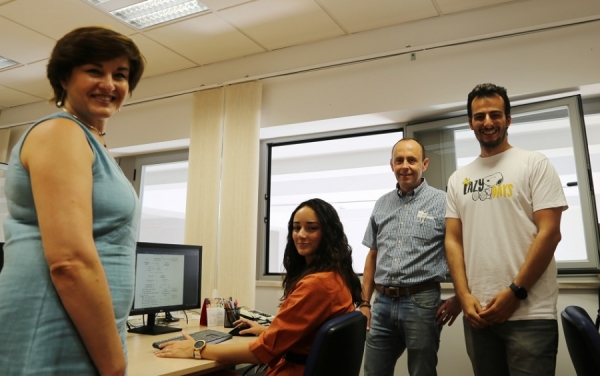Water scarcity is becoming one of the most pressing and complex problems in the world, but the digitization of the agricultural sector through the implementation of cutting-edge technologies is making it possible to tackle this problem through more efficient use of this resource.
If growers know the best time to irrigate, and the exact amount of water their crops need each day, they can perform optimal irrigation, thereby not squandering water and making more precise and efficient use of it. This possibility is already a reality.
Researchers Carmen Flores, Rafael González, Pilar Montesinos and Emilio Camacho, with the María de Maeztu Unit of Excellence, within the Department of Agronomy at the UCO (DAUCO), have developed an irrigation decision support system for the optimal scheduling of seven days of irrigation through the use of Information and Communication Technologies (ICTs), based on climate predictions and information from humidity sensors and irrigation meters installed in the field, and information on the fields' intrinsic characteristics. This tool, designed for outdoor woody and greenhouse horticultural crops, allows one not only to schedule their irrigation, but also to run an analysis of irrigation carried out over the course of a crop year, yielding a Water Footprint inventory of the crop in question. "With all this information collected by the devices, an inventory of the water used is carried out, which, together with the data on the crop's water needs in the year, makes possible an analysis of the adequacy of the irrigation applied, which, in turn, facilitates the detection of inefficiencies," explained researcher Carmen Flores.
This model was tested at an orange plantation and on a greenhouse tomato crop, although it was also adapted for olive groves and other greenhouse horticultural crops, such as eggplant, pepper and cucumber.
In the case of tomatoes, it was found that the model's irrigation recommendation and the irrigation actually carried out in the greenhouse were practically the same, and were quite in line with the crop's real needs. However, in the case of the orange trees, the comparison between their management and the recommendations of the model developed revealed that, with the same consumption of irrigation water, differences in its management (in terms of the frequency and duration of irrigation) affected the use of water in the soil. It was also demonstrated that the employment of controlled deficit irrigation strategies makes it possible to reduce the use of water for irrigation by up to 20%.
"This system determines the optimal time to irrigate and the exact amount of water that the crop needs," the researcher highlighted. In addition, thanks to the ICTs and the information acquired in real time by the monitoring devices installed in the field, the model updates the irrigation scheduling information daily, which varies acccording to the moisture content in the soil and weather and precipitation predictions.
Thanks to this technology, it is possible to make optimal use of water, a vital and scarce resource, and to offer consumers more sustainable products.
Reference:
Flores Cayuela, C., González Perea, R., Camacho Poyato, E. & Montesinos, P. (2022). An ICT-based decision support system for precision irrigation management in outdoor orange and greenhouse tomato crops. Agricultural water management, 269, 107686. doi: 10.1016/j.agwat.2022.107686


